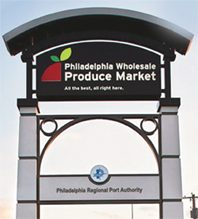Most importantly, Levin explains, “People just have to remember they can’t come in and purchase a handful of bananas—they have to purchase a 40-pound box of bananas! Everything is sold in bulk, by the case. A recent trend is individuals or groups buying for their communities in co-ops (or similar organizations) to get the best prices and freshest produce around.”
For Todd Penza, who heads up sales at his family business, Pinto Brothers, Inc., customers are customers, and even smaller purchases can add up to significant business—no matter where the buyers are from. “The cash customers who walk in here are one of our largest groups of customers. We make sure we pay special attention to their needs, because they’re such a strong customer base in this market.”
A similar sentiment was expressed by Rick Feighery, vice president of sales at Procacci Bros. Sales Corporation: “The way I feel is, we’ll take all the business that walks up to us. Individuals who walk in and buy single cases are just as important to me as those who buy truckloads. All the drops fill the bucket.”
Jack Collotti puts it this way: “The market has always been open to the public, so I don’t notice any change. We don’t have a primary customer base; we sell to everybody.”
Pros & Cons: Adapting to Change
As brokers, wholesalers, and shippers must adapt to changes in the marketplace and in policies, so must growers.
Among the major concerns are immigration reform, upcoming food safety legislation, and shifting to more eco-friendly production. Related to the latter, many growers have continued to experiment with integrated pest management, using minimal amounts of pesticides and herbicides in a scientific, targeted manner.
“We have very smart and innovative producers, who work through their industry channels to adopt these new tech research procedures,” commented Lela Reihart, a grower who is also director of the Bureau of Market Development at the Pennsylvania Department of Agriculture.
Learning new pest management techniques can be even more challenging in the face of constantly changing weather patterns. The mild winter and warm spring of 2011 and early 2012 led to an early harvest; in contrast, the seemingly endless winter and very cold spring of 2012 and 2013 led to crop damage in certain parts of the state.
May’s cold snap damaged tree fruit and some row crops, while freezing temperatures caused losses in processing tomato transplants that were protected but not yet in the ground. Tomatoes are the state’s top dollar commodity, followed by sweet corn, bell peppers, musk melon, cucumbers, and watermelon.



